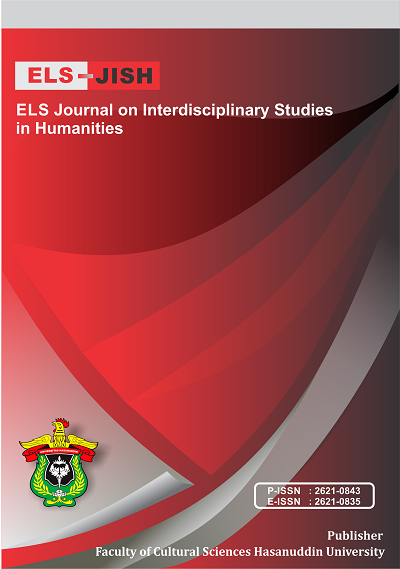“Emi lokan, Yoruba lokan”: expression of ideologies in Bola Tinubu’s political speech
DOI:
https://doi.org/10.34050/elsjish.v6i3.28025Keywords:
Bola Tinubu, CDA, Emi lokan, Ideologies, Political Speech, Yoruba LokanAbstract
Beyond the traditional import of language which is for communicative purpose and information sharing, its usefulness cuts across other strands such as for expression of one ideology or others, representation and identification of self and other social groups among others, especially within the political context. Previous linguistic studies on political discourse with emphasis on (intra party) electioneering campaign speeches have invested on the nexus between language and politics. Such studies, however, have not exteriorised expressions of ideologies in Emi lokan, Yoruba lokan campaign slogan of Bola Tinubu in the build-up to 2023 Nigeria’s presidential election. This study, consequently, studies the differing ideologies expressed in the Emi lokan, Yoruba lokan speech made by the All Progressive Congress’ presidential aspirant in the build-to the party’s 2023 presidential primary election. The data for the study is audio-visual of the speech obtained from the YouTube platform, which was rendered in the mixture of English and Yoruba languages, given the nature of the audience where the speech was made. The translated video was transcribed into MS Word. The selected excerpts were subjected to Critical Discourse Analysis, borrowing insight from van Dijk’s (2006) socio-cognitive model. The findings reveal that supremacist, collectivist, welfarist and ethnocentric ideologies are embedded in Bola Tinubu’s emi lokan slogan/speech which are indexed through certain discursive moves.
References
Amale, F. A., Ige, M., & Muopshin, J. (2022). Stance Taking in Some 2023 Presidential Aspirants’ Declaration Speeches. Vejoh-Veritas Journal of Humanities, 4(1 & 2).
Berlin, L.N. (2020). (ed.) Introduction. In Positioning and Stance in Political Discourse: The individual, the party, and the party line, Berlin Lawrence N. (ed.). P.vii. Vernon Press: USA.
DiS, J. V. (2021). Persuasive strategies in political speech: a contrastive analysis of Barrack Obama’s and Donald Trump’s electoral speeches. Diploma Thesis. Department of English Language and Literature. Masaryk University. Czech Republic.
Ezeife, A., & Igwebuike, E. (2010). Political slogans in Achebe’s A man of the people. Studies in Slang and Slogans (LINCOM Studies in Pragmatics, 18(1), 299-309.
Gee, J. P. (2014). An introduction to discourse analysis: Theory and method. routledge.
Kamalu, I., & Iniworikabo, P. B. (2016). Metaphors in selected political speeches of Nigerian democratic presidents. California Linguistic Notes, 40(2), 71-84.
Mwiinga, C. (2019). A discursive analysis of the 2016 election campaign discourse in Zambia. International Journal of Multidisciplinary Research and Development, 139-146.
Newsome, C. (2002). The use of slogans in political rhetoric. The Corinthian, 4(1), 3.
Obiora, H. C., Aboh, S. C., & Dioka, B. O. (2021). Critical Discourse Analysis of Selected Nigerian Political Hate Speeches. Journal of Language Teaching and Research, 12(3), 494-500.
Obisesan, K.A. and Ibrahim, S. (2021). Construction of identities and ideologies in campaign slogans of selected 2019 presidential candidates in Nigeria. Voices: A Journal of English Studies,5, 144-157.
Olorunsogo, D., & Ige, M. O. (2022). Other Representations in Politics:'O To Ge'Rhetoric in Nigeria's Election Campaigns. Journal of Humanistic and Social Studies, 13(2), 149-162.
Omozuwa, V. E., & Ezejideaku, E. U. C. (2008). A stylistic analysis of the language of political campaigns in Nigeria: Evidence from the 2007 general elections. OGIRISI: a New Journal of African Studies, 5, 40-54.
Oyeleye, L. and Osisanwo A. (2013). Expressions of ideologies in media accounts of 2003 and 2007 general elections in Nigeria. Discourse and Society, 24(6), 763-773.
Rahman, F., & Weda, S. (2019). Linguistic deviation and the rhetoric figures in Shakespeare’s selected plays. XLinguage" European Scientific Language Journal", 12(1), 37-52.
Sharndam, E.C. (2015). Political discourse: a critical discourse analysis of President Muhammadu Buhari’s inaugural speech. European Journal of English Language and Linguistic Research, 3, 9-21.
van Dijk, T. (2006). Ideology and discourse analysis. Journal of Political Ideologies, 11(2), 115-140.
Downloads
Published
How to Cite
Issue
Section
License
Copyright (c) 2023 Matthew Ige

This work is licensed under a Creative Commons Attribution-ShareAlike 4.0 International License.






